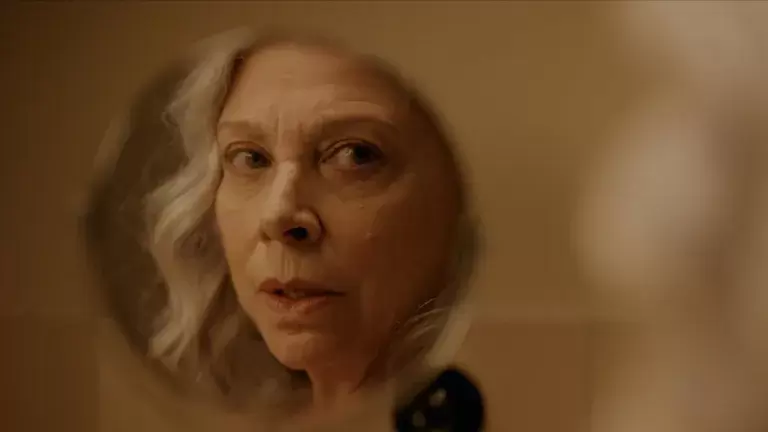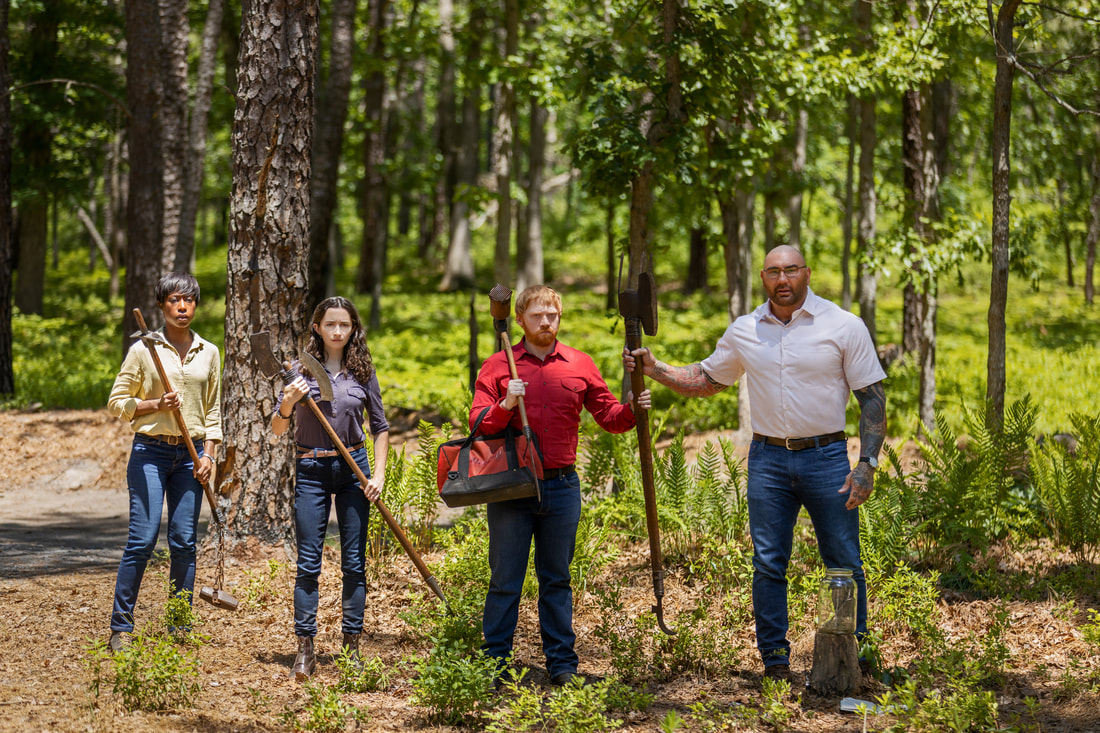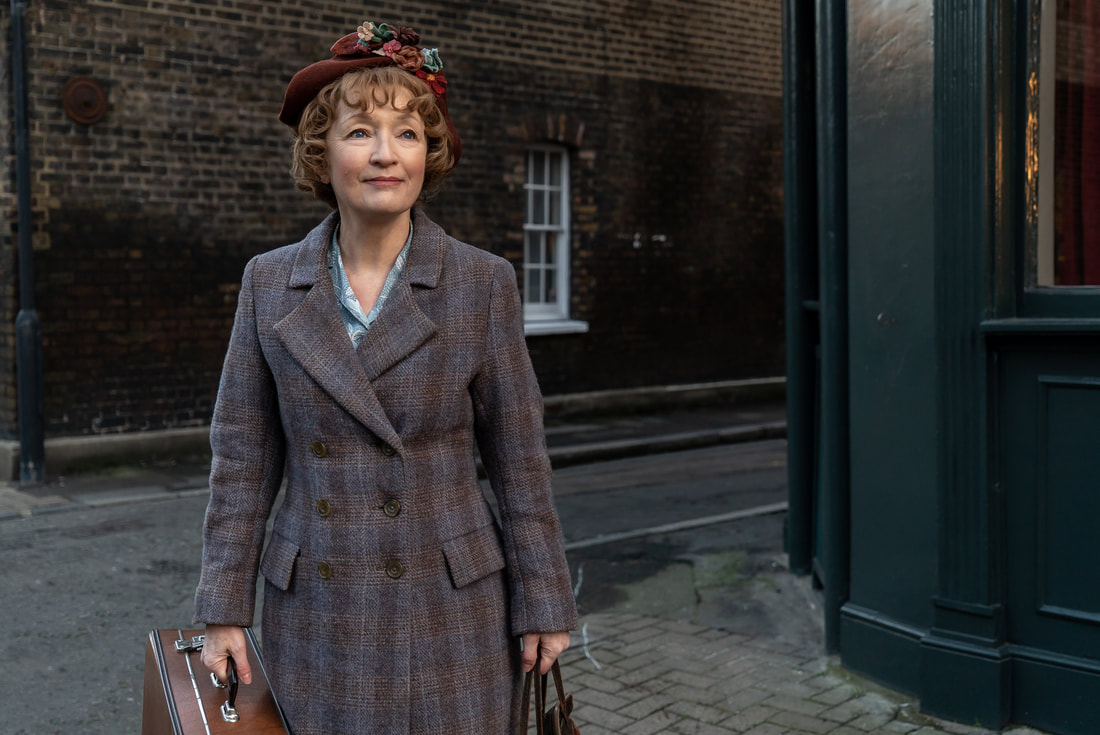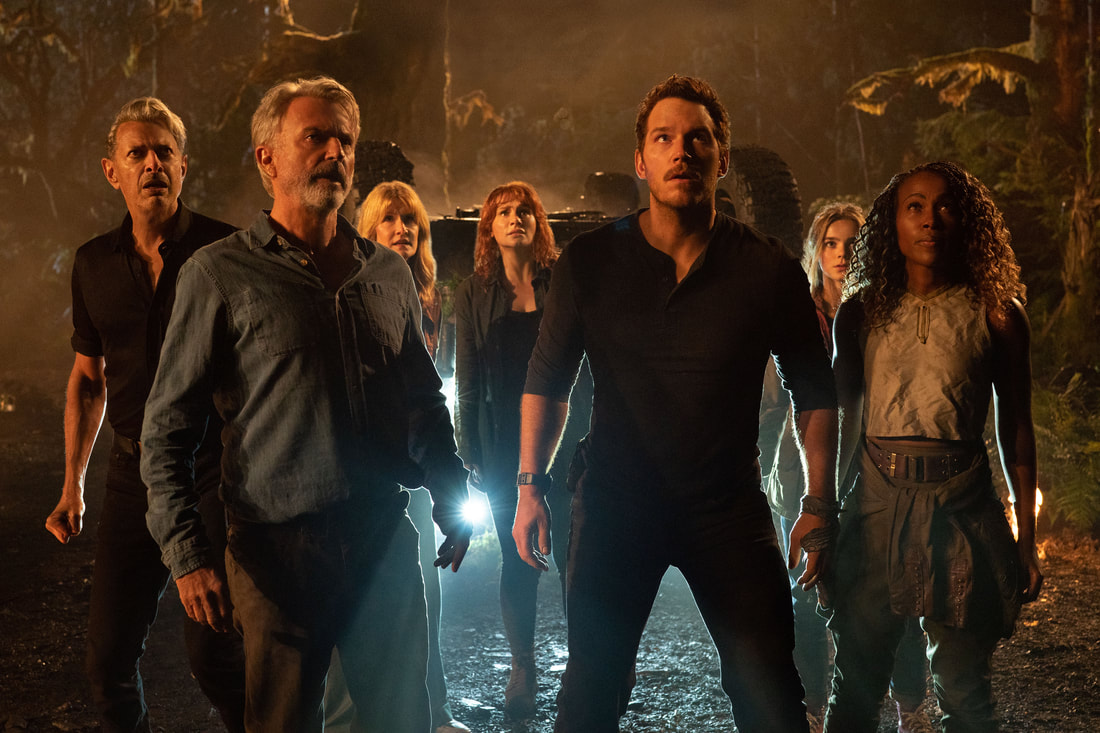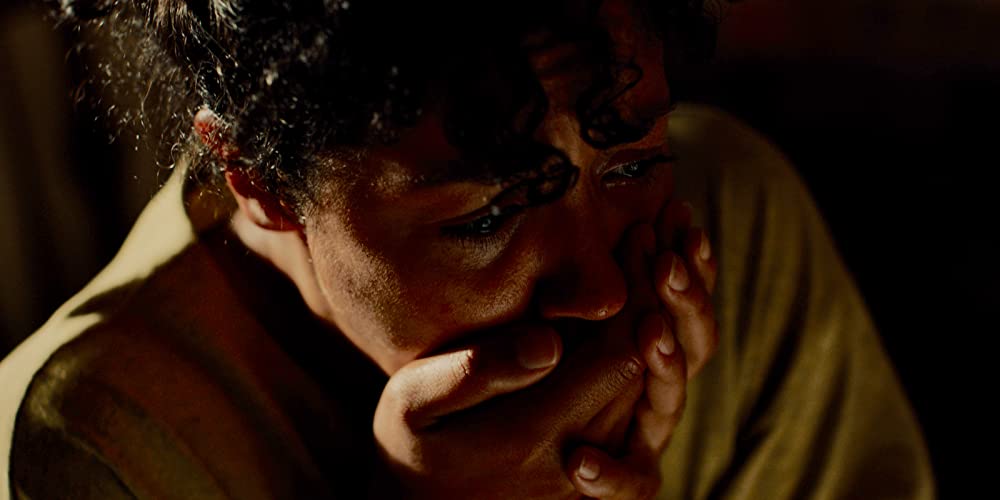|
Originally published on Elements of Madness.  L-R: Michelle McLeod stars as Mejal, Sheila McCarthy as Greta, Liv McNeil as Neitje, Jessie Buckley as Mariche, Claire Foy as Salome, Kate Hallett as Autje, Rooney Mara as Ona and Judith Ivey as Agata in director Sarah Polley’s film WOMEN TALKING. An Orion Pictures Release. Photo credit: Michael Gibson. © 2022 Orion Releasing LLC. All Rights Reserved. With an impressive cast, best-selling source material, two Oscar nominations, and one Oscar win, Women Talking has gotten a lot of buzz. Unlike some of this year’s other best picture nominees, Women Talking isn’t supposed to entertain crowds or draw hordes of movie fans to the box office. It’s supposed to make you think. Written and directed by Sarah Polley (Take This Waltz), the film is based on Miriam Toews’s novel of the same name which is inspired by events that occurred in an isolated Mennonite community in Bolivia. The novel explores what might have happened if women in the community had met in secret to decide what to do about ongoing sexual abuse. Together, they must figure out if they will leave, stay and fight, or do nothing. They carefully consider the pros and cons of each option, and they must ultimately choose between the familiarity and religious security of their community and the potential freedom they might experience in a world they know nothing about.
0 Comments
Originally published on Elements of Madness. When director Patricia Ortega found a revealing picture of her mother as a young woman, scantily clad in an open bathrobe, she didn’t recoil in embarrassment. She made a movie about it. Ortega was surprised by such a blatant display of sexuality from a Catholic woman whom she had only ever known as a mother, and she wanted to explore the role of passion, desire, and sexuality in older women. The main character of her film, Mamacruz, is a 70-something-year-old grandmother who earns a living doing small sewing jobs and taking care of the icons and figurines in the local Catholic Church. Cruz (Kiti Mánver) is also learning how to use a tablet so she can keep in touch with her daughter, who is in a dance company in Vienna. When Cruz accidentally stumbles upon pornography while messing around on the tablet, she begins a journey of self-discovery and seeks to reignite her sense of passion and pleasure. Despite the strictness of her religious community and the societal expectations for women her age, Cruz finds that there’s a lot more she could be getting out of life.
Maria Schrader Seeks to Honor the #MeToo Movement in “She Said,” Available on Home Video Now2/10/2024 Originally published on Elements of Madness. While the real-life work of an investigative journalist might feel like running head-first into a brick wall over and over again, movies and shows usually make it seem like an idealistic, noble, and exciting job that combines the thrill of detective work with the glamorous life of a writer. The 2022 movie She Said, directed by Maria Schrader (I’m Your Man) and written by Rebecca Lenkiewicz (Small Axe), highlights the work of two real-life investigative journalists, Jodi Kantor (Zoe Kazan) and Megan Twohey (Carey Mulligan). The movie portrays Kantor and Twohey as confident, career-driven women who balance their roles as journalists and mothers just as skillfully as they balance their morning cups of coffee as they make their ways through the bustling stress of the city into the prestigious New York Times building. But She Said isn’t all #girlbossing and go-getting. It’s bleak, slow, and depressing, trapped under a melancholy gray cloud that sets an appropriate tone for the story. In 2017, Kantor and Twohey published a story in the New York Times that exposed decades of abuse and misconduct by Hollywood producer Harvey Weinstein. While the story gave hundreds of women the courage to share their own stories about abuse and survival, it was initially very difficult for Kantor and Twohey to find women who were willing to risk their careers and reputations by going on the record about Weinstein’s misconduct (some of these women also risked legal action since Weinstein silenced several of the women he abused with settlements). She Said recounts Kantor and Twohey’s investigative process and the painstaking steps they took to shed light on systemic abuse in Hollywood.
Originally published on Elements of Madness. The title of Gina Prince-Bythewood’s latest film alone is enough to inspire strength, courage, and bravery. The movie itself, The Woman King, lives up to the inspirational connotations of its name. Set in West Africa in 1823, the story focuses on the Agojie, an all-female group of tough and fearless warriors who are dedicated to protecting the kingdom of Dahomey. Filled with beautiful costumes, expansive scenery shot on-location in Africa, powerful dance and fight choreography, and a deep-rooted sense of genuine sisterhood, The Woman King is a joy to watch. The outstanding cast brings lots of passion to the screen, but at times their efforts are undermined by a weak script. The narrative hiccups and uneven tone, however, aren’t enough to rob The Woman King of its power.
Originally posted on Elements of Madness. We’ve all been to at least one work event that went incredibly sour, but the average person’s worst day at the office has nothing on the nightmare of a client dinner that unfolds in Run Sweetheart Run. When pre-law student and single mom Cherie (Ella Balinska) puts on her best dress to meet one of her boss’s top clients for dinner, she has no idea that she’s about to experience the worst night of her life. The client, Ethan (Pilou Asbæk), is handsome, educated, sweet, charming, and filthy rich. He takes Cherie out to the best sushi spot in LA, followed by an impromptu trip to a skating rink, and the business dinner soon becomes a date. Cherie decides to return home with Ethan for a few drinks, but things take a turn for the worst. After starting the evening with high hopes for both her love life and her career, Cherie finds herself running all night from a crazed, violent, and relentless stalker who’s out for blood. All bets are off in Ethan’s sadistic, devilish game, and Cherie must rely on pure survival instincts and summon her innermost strength in order to have any chance of lasting the night.
Could You Make the Choice? M. Night Shyamalan Puts Certainty on Trial in KNOCK AT THE CABIN2/2/2023 If your expectations for Knock at the Cabin are based solely on M. Night Shyamalan’s previous film, Old (2021), those expectations probably aren’t high. Despite its fascinating concept, Old is stiff and awkward with unbalanced performances and an unrefined script. You might be tempted to make the same judgment about Knock at the Cabin after watching the first five minutes. The movie opens with stiff, over-rehearsed dialogue and awkward closeups that create an uneven tone and set a low bar for the rest of the movie. With vintage horror aesthetics in the opening credits and a creepy yet playful score, it’s difficult to tell whether or not Knock at the Cabin is taking itself seriously. But gradually, and then all at once, the tone becomes deadly serious. As the plot develops, it’s clear that Knock at the Cabin doesn’t suffer from the same problems as Old. M. Night Shyamalan’s latest film is a vicious, relentless mind game propelled by surprising and intense performances. With a script that gets exponentially better along the way, Knock at the Cabin far exceeds expectations.
Originally published on Elements of Madness. There’s no right or wrong way to make a feel-good movie. But there are certain elements that will make one feel-good film much more successful and enjoyable than another. Feel-good films require precise storytelling techniques and a little extra wow-factor in order to make an impact. In the case of Mrs. Harris Goes to Paris, that wow factor is the contagious optimism that’s reflected in every shot. At first glance, the story of Mrs. Ada Harris, an English house cleaner in the 1950s who dreams of owning her own Dior gown, seems like a predictable and unrealistic feel-good tale. But under the direction of Anthony Fabian (Good Hope), and with captivating performances by Lesley Manville (Let Him Go), Isabelle Huppert (Elle), Jason Isaacs (Mass), Lambert Wilson (Benedetta), Alba Baptista (Warrior Nun), Roxane Duran (The Cursed), and Ellen Thomas (Arcane), Mrs. Harris Goes to Paris emerges as a lovely cinematic gem. The movie had a theatrical release earlier this summer and is now available on Blu-ray and DVD.
Originally published on Elements of Madness. In case you missed the theatrical release of Dominion, here’s a spoiler-free rundown: The movie picks up four years after the events of Fallen Kingdom. Isla Nublar, the site of both the original Jurassic Park and the new Jurassic World, has been destroyed. The genetically engineered dinosaurs have been set free to roam the Earth and walk among humans. While ordinary people are trying to figure out how to live their lives with dinosaurs walking around, others have jumped on the opportunity to turn a profit. A dinosaur black market has emerged, and Claire Dearing (Bryce Dallas Howard) and Owen Grady (Chris Pratt) are working to save as many dinos as possible from the criminal underworld. They’ve set up camp in a remote mountain cabin where they can protect Maisie Lockwood (Isabella Sermon), the first human clone, from the clutches of sinister scientists and money-hungry opportunists. Meanwhile, Lewis Dodgson (Campbell Scott) has begun collecting dinos to study at his biotech company, Biosyn. But that’s not all Biosyn is up to. Their latest attempts to disrupt the agricultural industry have attracted the attention of one Dr. Ellie Sattler (Laura Dern), who turns to her old pals Dr. Ian Malcolm (Jeff Goldblum) and Dr. Alan Grant (Sam Neill) for help. The paths of the original and new characters eventually collide, bringing everyone together for one last face-off against the ferocious and bloodthirsty dinosaurs.
Originally published on Elements of Madness. “Dad, can you tell me a scary story?”
This is not how most children ask to be put to bed, but brave young Anna (Taliyah Blair) isn’t afraid of a few ghosts and goblins. Plus, her dad, Harry (Jonathan Nyati), is a great storyteller. Thus begins Jamie Hooper’s The Creeping, a delightful horror flick that will bring back memories of swapping ghost stories over a bucket of Halloween candy. While The Creeping is undeniably a ghost movie, it’s more likely to make you feel nostalgic than scared. Hooper takes a straightforward scary story and embellishes it with an R. L. Stine-esque style that will make you want to mix in some candy corn with your popcorn. You’re Invited to a Deadly Fun Party: Stream "Glass Onion: A Knives Out Mystery" on Netflix12/18/2022 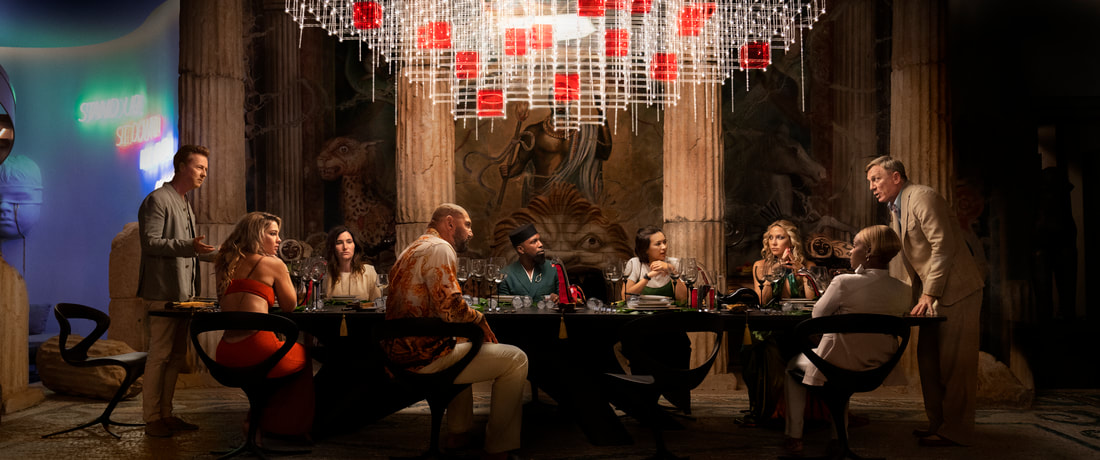 (L-R) Edward Norton as Miles, Madelyn Cline as Whiskey, Kathryn Hahn as Claire, Dave Bautista as Duke, Leslie Odom Jr. as Lionel, Jessica Henwick as Peg, Kate Hudson as Birdie, Janelle Monae as Andi, and Daniel Craig and Benoit Blanc in GLASS ONION: A KNIVES OUT MYSTERY. Cr. John Wilson/Netflix © 2022. Rian Johnson’s Knives Out (2019) doesn’t need a sequel. It’s a hilarious and delightfully stylized standalone film that showcases Johnson’s creative writing skills and directorial flair. It has an unbeatable cast, side-splitting one-liners, and a clever story that keeps us guessing until the very end. Why would any filmmaker try to match that success with a second movie? After all, sequels and follow-up movies are usually disappointing, and
Johnson had already set the bar pretty high with Knives Out. Maybe he wanted to challenge himself as a writer and director, or maybe he just couldn’t let go of the delightful main character, detective Benoit Blanc (Daniel Craig), and the colorful world that he inhabits. Whatever Johnson’s reasons may have been, he made the right decision in developing a second Knives Out movie. Glass Onion: A Knives Out Mystery exceeds expectations and asserts itself as a movie that’s just as fun, just as funny, and just as unique as its predecessor. Much like the beautiful Greek island where the cast of characters convenes for their murder mystery party, Glass Onion is the perfect mental escape. The script is clever and packed with intriguing, subtle details, and the movie as a whole is a treasure trove of fun, feel-good entertainment. |
"Our embodied spectator, possibly perverse in her fantasies and diverse in her experience, possesses agency...finally, she must now be held accountable for it." Categories
All
|

